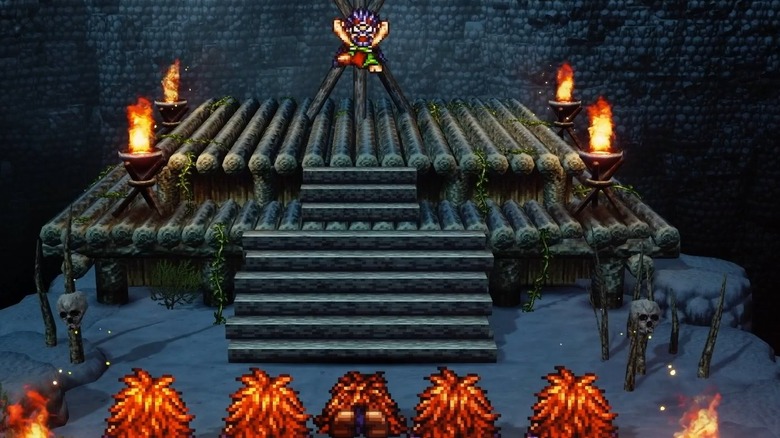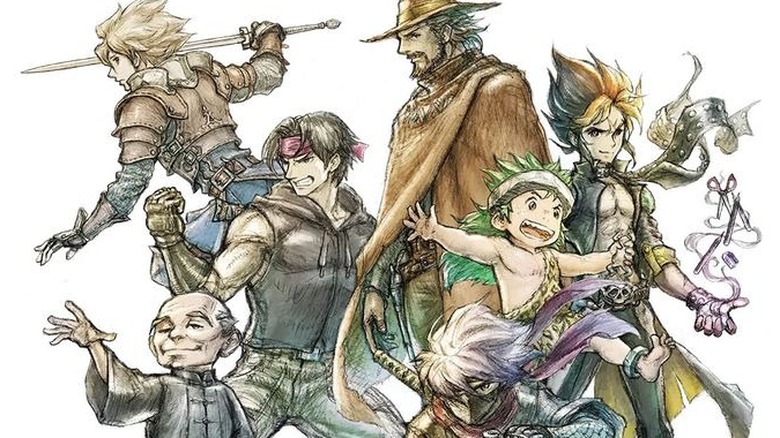What The Critics Are Saying About Live A Live
Players are currently living in a golden age of nostalgia gaming. With the wide assortment of retro titles available through services like PlayStation Plus and Xbox Game Pass, not to mention the revival of many classics through HD remakes or rereleases on Nintendo's Switch, gamers are able to now more than ever dig into a library of the best the gaming industry's past had to offer. These include plenty of titles that released under the radar. Whether because of the lack of a publisher or a means to distribute globally, plenty of games from the 80s and 90s lived and died in relative obscurity.
Thankfully, with publisher's eyes on player's renewed interest in experiencing retro games, many have set to work reviving beloved titles and franchises. It's something fans have already seen Square Enix jump on with "Final Fantasy 7 Remake" and the "Chrono Cross" remaster. And now, Square Enix is bringing players a bizarre RPG that never saw an official commercial release outside of Japan. Upon its release in 1994, "Live A Live" offered players experimental gameplay and a narrative that branched through all of history, but do the weighty ambitions of what's been considered one of the best RPGs of all time still hold up? Here's what critics are saying about the brand new "Live A Live" remake.
Experimenting is as fun now as it was in 1994
Unlike other RPGs of the time, "Live A Live" aimed to present players with an enjoyable RPG that experimented with how it delivered storytelling and gameplay. The title starts players off at a character select screen and initially offers seven vignettes, each starring its own unique protagonist, characters, and historical era. Players can tackle chapters in any order they choose, with each acting almost like its own micro-game within "Live A Live." It's a feature that impressed when the game initially released, and it's something that still makes it stand out with critics.
Rebekah Valentine of IGN remarked, "Not only do the different chapters take place in different eras, but each one distinguishes itself with unique characters and mechanics to suit them. In prehistory, for instance, language has yet to be invented, so all the storytelling brilliantly takes place with animation and imagery." Andrew Reiner of Game Informer similarly lauded the narrative and gameplay approach, saying, "From a troglodyte battling dinosaurs in the early prehistoric days to a robot lost in the cosmos in the distant future, each protagonist explores a wildly different story path backed by just as many gameplay changes."
Above all else, critics have loved the way in which "Live A Live" uses individual stories and settings to weave together a larger tale. However, the title hasn't been universally praised.
Characters drown under Live A Live's ambitions
Chief among the issues critics have had with "Live A Live" is the fact that its experimental ideas actually get in the way of its characters. The smattering of chapters that focuses on a different cast of faces and completely different narrative beats do little to help cement a player's attachment to any one protagonist — especially when compared to the more traditional RPG journey a single party. Further, players won't often spend more than a couple of hours with each character and setting, which can mean shifting attention from one chapter to the next before any significant character or world building occurs. In this way, some critics feel "Live A Live" robs players of one of the most important aspects of an RPG: developed characters.
Chris Karnadi of Polygon said, "The literary ambition is only clear at the end of the game, when a lightbulb comes on and all the characters and their scenarios are threaded together as one story. But the impact of that revelation is weakened because the characters haven't made an impression along the way." Karnadi cites the short stints with each major character as the reason for this, which leaves little to no time for learning motivations or connecting with specific characters.
It wasn't just one critic with this complaint though. Chris Carter of Destructoid seconded the view, writing, "The micro-story strategy also has the unintended outcome of seeing strong narratives cut short, as there isn't enough time to sink your teeth into them."



